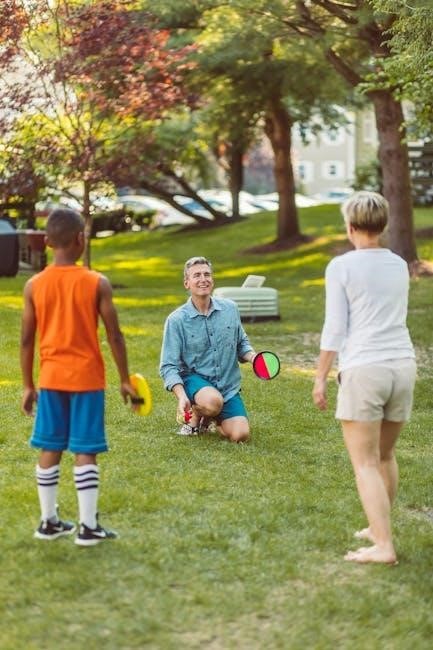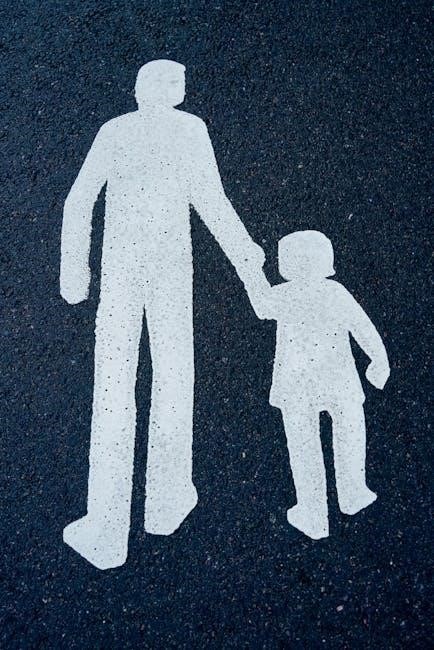
lost in space parents guide
Lost in Space blends thrilling space adventures with heartfelt family dynamics‚ making it a compelling choice for families seeking entertainment with substance. Its mix of action‚ drama‚ and relatable themes creates a shared viewing experience‚ though parental guidance is recommended to ensure suitability for younger audiences.
Overview of the Series and Its Target Audience
Lost in Space is a Netflix reboot of the 1960s classic‚ following the Robinson family as they navigate survival in space after a catastrophic event. The series blends action‚ drama‚ and science fiction‚ appealing to a wide audience‚ including families and fans of prestige drama. It targets viewers who enjoy thrilling adventures with emotional depth‚ focusing on themes like family unity and resourcefulness. While suitable for older children and teens‚ its TV-PG rating suggests parental guidance due to moderate threats and intense scenes. The show’s mix of suspense and heartfelt moments makes it a compelling choice for family viewing‚ though parents may want to preview content for younger or sensitive viewers.
Importance of a Parents Guide for Family Viewing Decisions
A parents guide is essential for helping families decide if Lost in Space is suitable for their children. It provides insights into content‚ such as violence‚ emotional intensity‚ and mature themes‚ allowing parents to make informed decisions. Given the show’s TV-PG rating‚ understanding its content helps parents gauge its appropriateness for younger viewers. The guide highlights elements like frightening creatures‚ intense action‚ and emotional struggles‚ which may concern some parents. By reviewing this information‚ families can ensure the series aligns with their values and their child’s sensitivity level‚ fostering a safe and enjoyable viewing experience for all.

Age Ratings and Certifications for “Lost in Space”
Lost in Space is rated TV-PG for moderate threats and injury details. International certifications vary‚ with ratings like PG-13 in Singapore and 12 in the UK‚ reflecting its family-friendly yet intense nature.
TV-PG Rating and Its Implications for Younger Viewers
The TV-PG rating of Lost in Space indicates that parental guidance is recommended due to moderate content. While the series is generally suitable for older children‚ younger viewers may find certain scenes intense or unsettling. The show features occasional violence‚ frightening alien creatures‚ and emotional struggles‚ which could be challenging for sensitive or younger audiences. Parents should preview episodes or watch alongside their children to address any concerns and ensure the content aligns with their child’s maturity level. The TV-PG rating serves as a guide to help families make informed viewing decisions‚ balancing the show’s thrilling adventure with its more mature themes.
International Ratings: UK‚ US‚ Canada‚ and Other Countries
Lost in Space has received varying ratings globally‚ reflecting its suitability for different age groups. In the US‚ it holds a TV-PG rating‚ while the UK rates it 12 by the BBFC. Canada also assigns a 12 rating‚ and other countries like Brazil‚ Germany‚ and South Korea have ratings of 14‚ 12‚ and 12‚ respectively. Japan rates it G‚ and Singapore assigns a PG13. These international ratings provide guidance for parents worldwide‚ helping them determine if the show is appropriate for their children based on cultural and regional standards. This variability underscores the importance of reviewing local ratings to ensure the content aligns with individual family values and viewing preferences.
Guidance on Appropriate Age Groups for the Series
Lost in Space is generally suitable for children aged 12 and above‚ though parental discretion is advised for younger viewers. The series features complex themes‚ mild profanity‚ and intense scenes that may not be appropriate for all children. While older kids can enjoy the show’s mix of adventure and family values‚ younger audiences may find certain moments emotionally challenging. Parents are encouraged to watch alongside their children to gauge their maturity and sensitivity levels. This approach ensures that the series’ educational and entertaining elements are enjoyed responsibly‚ fostering a positive viewing experience for the whole family while addressing individual sensitivities.

Content Suitability for Children: What Parents Need to Know
Lost in Space contains intense scenes‚ mild profanity‚ and emotional struggles‚ making it essential for parents to assess their child’s sensitivity before allowing viewing. Mature themes and suspenseful moments may not suit younger or more sensitive children‚ while older kids can enjoy the adventure and family-driven narrative. Parental guidance is recommended to ensure the content aligns with individual maturity levels‚ fostering a safe and engaging viewing experience for the whole family.
Violence and Intense Scenes in the Series
Lost in Space features action-packed sequences and suspenseful moments‚ including alien encounters‚ dangerous crises‚ and occasional violence‚ though without excessive gore. Scenes depicting characters in peril‚ such as falling into icy crevices or battling hostile creatures‚ may unsettle younger viewers. While the series avoids graphic details‚ the intensity of these situations could be overwhelming for sensitive children. However‚ the focus remains on the family’s resilience and problem-solving‚ making it suitable for older kids who can handle thrilling adventures. Parents should preview episodes to assess their child’s readiness for such content‚ ensuring it aligns with their maturity and sensitivity levels.
Frightening and Emotional Moments for Young Audiences
Lost in Space contains scenes that may disturb younger viewers‚ including encounters with eerie alien creatures and intense action sequences. The series explores emotional struggles‚ such as fear‚ separation anxiety‚ and stress‚ which could resonate deeply with children. Moments of peril‚ like characters being trapped or lost‚ might evoke strong reactions. While these elements are integral to the story‚ they could be overwhelming for sensitive or younger audiences. Parents should be prepared to address any fears or questions their children may have after watching‚ ensuring they understand the fictional context and reassuring them when necessary.
Profanity and Mature Themes in the Show
While Lost in Space is generally family-oriented‚ it includes mild profanity such as “hell‚” “damn‚” and “crap‚” which may concern some parents. Mature themes like betrayal‚ sabotage‚ and moral dilemmas are present‚ adding depth to the story. These elements are not overly explicit but still warrant parental awareness. The series avoids explicit sexual content or nudity‚ focusing instead on the family’s survival and teamwork. Parents should review the content to decide if it aligns with their child’s sensitivity and maturity level‚ ensuring they are prepared to discuss any complex themes that arise.
Positive Themes and Messages for Family Viewing
Lost in Space emphasizes family values‚ teamwork‚ and resilience‚ making it a great choice for families. It highlights problem-solving and resourcefulness‚ with positive role models for kids.
Family Values and Teamwork in the Face of Adversity
Lost in Space showcases the Robinson family’s ability to unite and support each other through challenges‚ emphasizing trust‚ loyalty‚ and collaboration. The series highlights how each family member contributes their unique skills to overcome adversity‚ fostering a sense of unity and purpose. Themes of mutual respect and reliance are central‚ as the characters work together to survive on an alien planet. This dynamic encourages young viewers to value teamwork and understand the importance of standing together as a family‚ even in the face of uncertainty. The show’s portrayal of strong family bonds offers a positive message for both children and parents‚ promoting unity and resilience in the face of adversity.
Problem-Solving and Resourcefulness as Key Themes
Lost in Space excels at showcasing problem-solving and resourcefulness‚ as the Robinson family faces countless challenges while stranded on an alien planet. Each episode highlights the characters’ ingenuity‚ whether it’s repairing damaged equipment‚ navigating treacherous terrain‚ or outsmarting hostile creatures. The series encourages critical thinking and creativity‚ as the family repeatedly devises clever solutions to survive. These themes are particularly inspiring for young viewers‚ as they demonstrate how intelligence and determination can overcome even the most daunting obstacles. By emphasizing resourcefulness‚ the show promotes a mindset of resilience and adaptability‚ making it a valuable watch for children and parents alike.
Role Models and Character Development for Kids
Lost in Space offers strong role models through its well-developed characters‚ providing valuable lessons for children. The Robinson family members‚ particularly the parents‚ demonstrate leadership‚ responsibility‚ and teamwork. Will Robinson’s curiosity and bravery highlight the importance of perseverance and learning from mistakes. Dr. Smith and the Robot‚ though flawed‚ show redemption and loyalty. The series emphasizes empathy‚ trust‚ and the value of family bonds‚ making it a rich source of positive character development. These elements help children understand complex emotions and ethical decision-making‚ fostering personal growth and moral awareness in a engaging and relatable way.

Educational Value and Learning Opportunities
Lost in Space sparks curiosity in science‚ technology‚ and space exploration‚ offering learning opportunities through its futuristic themes and problem-solving scenarios‚ inspiring kids to engage with STEM concepts.
Science‚ Technology‚ and Space Exploration Themes
Lost in Space immerses viewers in a futuristic world of space exploration‚ showcasing advanced technologies and scientific concepts. The series highlights the importance of STEM skills‚ as the Robinson family uses innovation and resourcefulness to overcome challenges. From navigating zero gravity to understanding alien ecosystems‚ the show sparks curiosity about the universe. Themes like robotics‚ engineering‚ and survival strategies are woven into the storyline‚ offering kids a thrilling way to learn about science and technology. While the show is fictional‚ it encourages critical thinking and an appreciation for the wonders of space exploration‚ making it a valuable watch for young audiences interested in STEM fields.
Encouraging STEM Interest in Children
Lost in Space serves as a powerful tool to ignite STEM curiosity in children. The series showcases a family relying on science‚ technology‚ engineering‚ and math to survive. From building shelter to repairing robots‚ the characters demonstrate problem-solving skills that kids can emulate. The show’s emphasis on innovation and critical thinking encourages young viewers to explore STEM fields. Parents can use the series to spark discussions about real-world applications of STEM concepts‚ making learning fun and engaging. By blending adventure with education‚ Lost in Space inspires the next generation of scientists and engineers‚ proving that STEM can be both exciting and accessible.
Moral Lessons and Life Skills for Young Viewers
Lost in Space offers valuable moral lessons and life skills for children‚ emphasizing teamwork‚ responsibility‚ and resilience. The Robinson family’s struggles highlight the importance of collaboration and trust‚ teaching kids to rely on others in challenging situations. Characters like Will and Penny demonstrate empathy and courage‚ showing young viewers how to face adversity with determination. The series also explores themes of forgiveness and understanding‚ as characters confront their flaws and learn from mistakes. These lessons help children develop emotional intelligence and a strong moral compass‚ making the show not only entertaining but also enriching for young audiences. The series inspires kids to be resourceful and compassionate in their own lives.

Parental Discretion Advised: Specific Scenes and Elements
Lost in Space features intense action‚ frightening alien creatures‚ and emotional struggles‚ which may unsettle younger viewers. Parental guidance is advised due to these elements.
Mild Profanity and Suggestive Content
While Lost in Space avoids explicit nudity or sexual content‚ it does include mild profanity such as “crap‚” “hell‚” and “damn.” These instances are infrequent but may still prompt parental discretion. Suggestive content is minimal‚ with brief kissing scenes and no overtly romantic or sexual themes. The show’s focus remains on family survival and adventure‚ but parents should be aware of the occasional use of strong language and subtle adult humor. Overall‚ the series strikes a balance between family-friendly entertainment and mature elements‚ making it suitable for older children and teens with guidance.
Frightening Alien Creatures and Intense Action
Lost in Space features unsettling alien creatures and intense action sequences that may disturb younger viewers. The show includes scenes with menacing creatures‚ such as giant spiders and hostile robots‚ which can be frightening for children. Additionally‚ the series portrays life-threatening situations‚ including crashes‚ explosions‚ and battles with extraterrestrial beings. These elements‚ while thrilling for older audiences‚ may require parental discretion for younger children who are sensitive to horror or suspense. The emotional intensity of these moments underscores the need for parents to assess their child’s sensitivity before watching together.
Emotional Struggles and Stressful Situations
Lost in Space explores the emotional toll of survival in a hostile environment‚ with characters facing despair‚ fear‚ and personal conflicts. The series delves into the psychological impact of isolation‚ as the Robinson family navigates betrayal‚ loss‚ and the constant threat of danger. Scenes of intense emotional struggle‚ such as Will’s bond with the robot and the family’s desperate attempts to escape‚ may resonate deeply with younger viewers. Some characters‚ like Dr. Smith‚ grapple with morally complex choices‚ adding layers of tension. While these moments enhance the show’s depth‚ they may require parental guidance to help children process the emotional weight and stressful scenarios portrayed.
Comparisons with Other Versions of “Lost in Space”
Lost in Space has evolved from its 1960s campy origins to the 1998 film’s darker tone‚ with the 2018 reboot offering a balanced blend of drama and family appeal‚ satisfying both nostalgic fans and new audiences.
Differences Between the 2018 Reboot and the 1960s Original
The 2018 reboot of Lost in Space offers a modern‚ dramatic twist compared to the campy‚ episodic nature of the 1960s original. While the classic series focused on Dr. Smith’s antics and the Robot‚ the reboot delves deeper into character development and family dynamics. The original series was lighter in tone‚ with less emphasis on survival stakes‚ whereas the reboot presents a more grounded‚ realistic portrayal of space exploration and its dangers. The 2018 version also expands on the Robinson family’s backstory and emotional struggles‚ creating a more complex narrative. This evolution makes the reboot appealing to both nostalgic fans and new audiences seeking a blend of adventure and emotional depth.
Contrasting the 2018 Series with the 1998 Film
The 2018 Lost in Space series differs significantly from the 1998 film in tone and storytelling. The film‚ starring Gary Oldman‚ was more action-oriented‚ with a darker tone and a focus on special effects. In contrast‚ the 2018 series emphasizes character development‚ family dynamics‚ and emotional depth‚ offering a more nuanced narrative. While the film was a standalone story‚ the series provides a serialized approach‚ exploring the Robinsons’ survival and relationships over multiple seasons. The series also modernizes the story‚ incorporating advanced technology and more complex moral dilemmas‚ making it more engaging for contemporary audiences seeking both adventure and emotional resonance.
Evolution of Family-Friendly Content in the Franchise
The Lost in Space franchise has evolved significantly in its approach to family-friendly content. The original 1960s series was primarily aimed at children‚ focusing on campy humor and simplistic storylines. The 1998 film introduced darker themes and more intense action‚ appealing to older audiences but limiting its suitability for younger viewers. The 2018 series strikes a balance‚ blending thrilling adventures with emotional depth and moral lessons‚ making it accessible to a broader family audience. This shift reflects a growing emphasis on creating content that entertains while fostering meaningful discussions and shared experiences among family members of all ages.
Final Thoughts and Recommendations for Parents
Lost in Space offers a mix of adventure and emotional depth‚ making it a great family watch with proper guidance. Parents should preview content to ensure suitability for their child’s sensitivity level and engage in open discussions about the show’s themes and scenes.
How to Decide If the Show Is Right for Your Child
Deciding if Lost in Space is suitable for your child involves assessing their sensitivity to intense scenes‚ mild profanity‚ and emotional content. Consider their maturity and interest in sci-fi themes. Watching episodes together allows for open discussions about the show’s elements‚ ensuring it aligns with your child’s readiness and your family’s values. Parents are encouraged to preview content and use available ratings and reviews as guides to make an informed decision.
Tips for Watching “Lost in Space” as a Family
Watching Lost in Space as a family can be a rewarding experience with proper preparation. Start by viewing the first few episodes with your child to gauge their reaction to intense scenes or mild profanity. Encourage open discussions about the show’s themes‚ such as teamwork and problem-solving‚ to help younger viewers process the content. Highlight positive role models‚ like the resourceful Robinson family‚ to foster admiration for their resilience. Create a cozy environment where questions and concerns can be freely expressed; This shared viewing experience not only strengthens family bonds but also allows parents to guide their children through complex moments‚ ensuring the show aligns with their values and maturity levels.
Encouraging Open Conversations About the Show’s Content
Fostering open conversations about Lost in Space helps children process its complex themes and emotions. Parents should ask questions like‚ “How did that scene make you feel?” or “What do you think the characters should have done?” This encourages critical thinking and emotional intelligence. Discussing the show’s moral lessons‚ such as honesty and teamwork‚ reinforces positive values. Addressing any fears or confusion about intense scenes‚ like encounters with alien creatures‚ can provide reassurance. By engaging in these discussions‚ parents ensure their children not only enjoy the series but also learn from its meaningful content‚ turning screen time into a valuable family bonding experience.